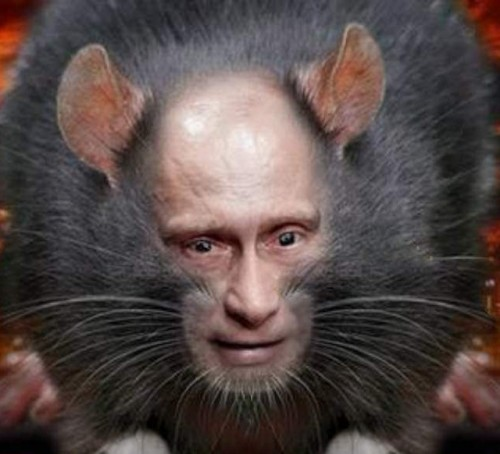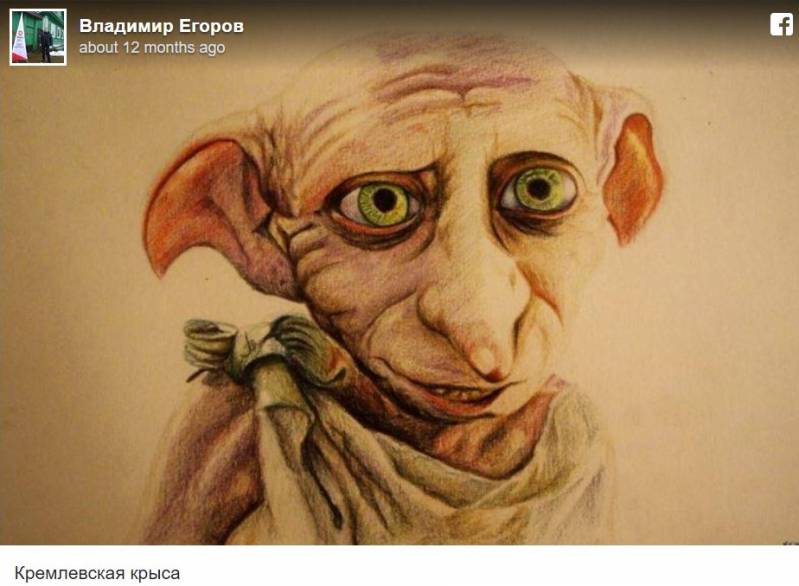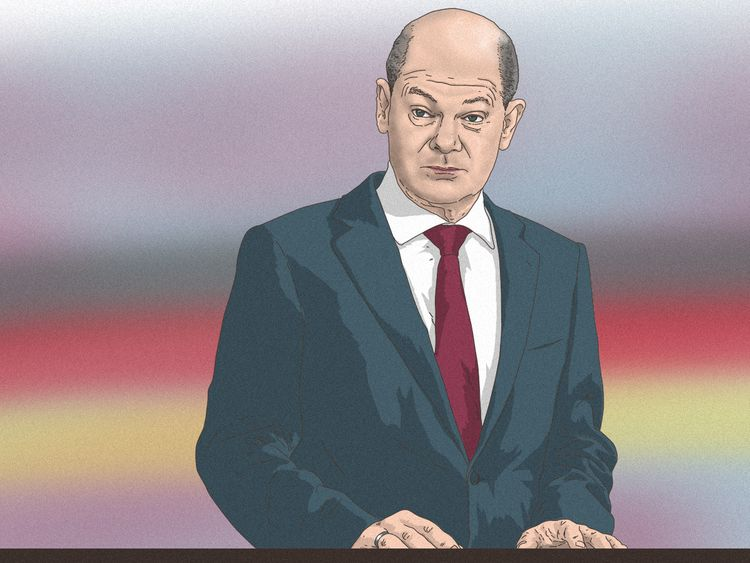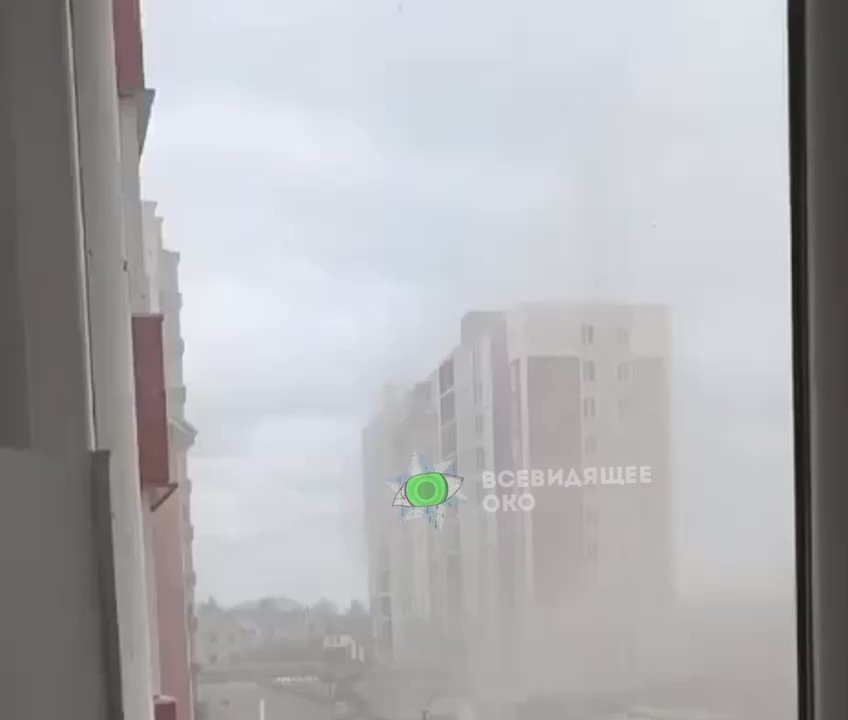Putin The Kremlin Rat - News Review
- Get link
- X
- Other Apps
The Kremlin Rat and his options - Post Link
Nobody knows how Russia's war of aggression against Ukraine will end, but most scenarios range from bad to worse. To grasp them, start by considering what is indubitably the world's most notorious rat.
That's the one Russian President Vladimir Putin claims he once - as a boy in what was then Leningrad - chased down a hallway. Cornered, the rat turned and attacked him.
Why has Putin made sure that this anecdote keeps getting recycled among Russia watchers the world over? The conventional wisdom is that it's yet another of his veiled threats. I'm that rat, except that I have nuclear claws, he implies. So don't corner me.
This vantage point - let's call it the rat's-eye view - must factor in all possible scenarios. If the analysis were about what's good for Russia, the invasion would never have started at all, and could be ended at any time with a negotiated settlement. After all, the attack has only hurt national interests, by isolating the country internationally and impoverishing more of its population. But Russia isn't the relevant actor. The metaphorical rat in the Kremlin is.
By all appearances, Putin is nowadays isolated and in his own mental world. Unlike his Soviet predecessors, he has no politburo around him or other credible checks and balances; he decides alone. And like other current and former tyrants - Saddam Hussein springs to mind - he has reason to worry that his own political failure is less likely to end in a tedious but placid retirement than in something rather more violent and abrupt.
Viewed from the rat's perspective, therefore, there are lots of dead-end hallways around. With that in mind, the scenarios look as follows.
The Ukrainians win
A heroic Ukrainian defense that actually repels Russian forces remains militarily unlikely, but is of course the preferred outcome for most of the world. A traumatized but triumphant Ukraine would link up with a newly coherent and determined European Union and accelerate its integration into the democratic West. NATO would have a new sense of purpose. China, with its eye on Taiwan, would think twice about causing its own trouble.
But Putin would be in that metaphorical corner. He's been posing as Russia's defender against an allegedly aggressive West and redeemer of ethnic Russians and brother Slavs everywhere. A Ukrainian victory would make all that propaganda untenable. He could not survive the defeat politically and knows it. Therefore he won't allow this scenario to happen. Instead of withdrawing, he'll follow one of three other paths.
A Russian Reign of Terror
He could escalate the attack dramatically - but still with only conventional weapons. Basically, that means bombing Ukraine into submission. The loss of civilian and military lives would be horrendous, but Putin wouldn't care. He would incorporate a seething and resentful Ukraine - either as a nominally independent puppet state or a subdivision of Greater Russia - and maybe add Belarus for good measure.
To repress dissent at home and in Ukraine, Putin would have to complete his transformation of Russia into a police state, eliminating and persecuting the last remnants of free speech. His empire would become a permanent pariah in the international community. The world would have a new Iron Curtain.
Another Afghanistan
Or he could escalate less dramatically, sending just enough Russian military might into Ukraine to avoid outright defeat. The country could then become what Afghanistan was to Soviet leader Leonid Brezhnev after 1979, or to the U.S. and its allies after 2001: a quagmire.
The cost in human terms would still be shocking - above all to Ukrainians, but also to Russian soldiers and ordinary Russians suffering worse repression and hardship from sanctions. Putin wouldn't mind that, provided he thinks his place in the Kremlin stays secure. But from the rat's-eye view, a quagmire looks a lot like getting stuck in that hallway corner indefinitely.
Escalate to de-escalate
If he is truly like the rat that attacked him, Putin will therefore at least consider another - literally nuclear - option. It's the one he's already hinted at. Claiming that NATO and the EU are cornering him by supporting Ukraine with weapons and other wherewithal, he could launch one or more "limited" nuclear strikes with so-called tactical (here meaning low-yield) warheads.
He'd wager that the West would not retaliate on behalf of Ukraine, because that would trigger a nuclear exchange with bigger "strategic" weapons, ending in Mutual Assured Destruction (MAD), as it was known during the Cold War. But like the rat, he'd take the risk.
Ukraine, like Japan in 1945, would have no choice but to surrender. That's why military wonks call this strategy "escalate to de-escalate." But the world would never be the same. The names Hiroshima and Nagasaki would be joined by others on humanity's list of doom. And yet Putin could say that he got himself out of one particular hallway's corner.
Another Russian Revolution
There are also more optimistic scenarios. Despite Putin's curtain of propaganda and disinformation, enough Russians understand the circumstances of his unprovoked invasion, and the cataclysmic risks. They could revolt. This could take the form of a broad-based movement centered around an opposition leader like Alexey Navalny. Or it could be a coup or putsch from within the elite.
Neither kind of insurrection looks likely for now, unfortunately. Russians may have noticed that the Belarusians next door have been heroically resisting their dictator since August 2020, with no success but lots of brutal repression to show for it. And any member of what remains of Putin's inner circle who contemplates a putsch will remember the fate of the conspirators around Claus von Stauffenberg in 1944.
Nonetheless, a homegrown Russian revolution would be by far the best outcome. The new regime in Moscow could blame the attack on Putin alone, which happens to be true. It could therefore withdraw without looking weak. The international community could welcome Russia back with open arms. The world, including Russia, would become a better place.
China intervenes
A second-best but more plausible scenario involves Beijing. Officially, China under President Xi Jinping is, if not Russia's ally, at least its partner in jointly staring down the American-led West. But China considers itself a rising power and Russia a falling one. As Xi sees it, Putin is sometimes useful but also a potential liability.
In particular, China is deeply conflicted about Putin's attack because it violates another country's national sovereignty, the principle Xi would invoke if he ever swallowed Taiwan (which he considers a Chinese province) and demanded that the U.S. stay out. And China, which has a small but fast-growing nuclear arsenal, certainly wouldn't countenance the use of tactical nukes and the resulting global chaos.
For now, Xi's ambivalence has condemned Beijing to an unsustainable doublespeak. At the United Nations this week, 141 countries voted to deplore Putin's aggression. China could have joined the four rogues (Belarus, North Korea, Eritrea and Syria) who voted with Russia against the resolution. Instead, along with 34 other countries, it merely abstained.
If China decided to restrain Putin, it would have the clout. It could withdraw the economic and diplomatic lifelines Moscow needs. At the same time it could discreetly find secret trap doors at the end of hallways. After all, the best way to deal with a cornered rat is usually to let it escape before it does more harm.
Comments Disclaimer: These are the personal opinions of the author.
US Sen. Lindsey Graham called on Russians to assassinate President Vladimir Putin Thursday night, as Ukraine pleaded with the West to fight the “nuclear terror.”
Graham, 66, a South Carolina Republican, made the call to action on Twitter as he compared Putin to Roman dictator Julius Caesar and Nazi leader Adolf Hitler.
“Is there a Brutus in Russia? Is there a more successful Colonel Stauffenberg in the Russian military?” Graham wrote.
“The only way this ends is for somebody in Russia to take this guy out. You would be doing your country – and the world – a great service.”
Putin was said to be holed up in the Ural Mountains, fuming at the resistance his army is facing in Ukraine — and at home — as his attack on Russia’s peaceful neighbor entered its second week.
Graham’s extraordinary call for the assassination of a head of state came as Ukraine President Volodymyr Zelensky called on Europe to take “immediate action” after Russian troops shelled the continent’s largest nuclear power plant Friday morning.
If the Zaporizhzhia plant in the port city of Enerhodar had exploded, it would be “the end for everyone. The end for Europe. The evacuation of Europe,” Zelensky said.
A day earlier, Graham had reportedly said it was a mistake for his political ally former President Donald Trump to call Putin a “genius” for the unprovoked war.
“Let’s just make it clear, Putin’s not a genius, he’s a war criminal,” said Graham, according to CNN.
A second round of peace talks between Russia and Ukraine concluded on March 3 with no progress. According to reports, that means an assault by the Russian forces on Kyiv has become much more likely.
The two sides met in the Brest region of Belarus on the Ukrainian border to continue negotiations, but the respective positions remain wide apart, according to reports from the meeting.
"To our great regret, we did not get the results we were counting on," Ukrainian presidential adviser Mykhailo Podolyak said.
Both sides said they wanted a possible ceasefire for evacuating civilians through humanitarian corridors.
Russia's Foreign Minister Sergey Lavrov had said prior to the meeting that Moscow was ready for talks to end the fighting in Ukraine but would continue to press its effort to destroy Ukraine's military infrastructure.
Ukrainian Foreign Minister Dmytro Kuleba said his country was ready for talks to resume, but added that Russia's demands had not changed and he would not accept any ultimatums.
The Kremlin called for peace talks over the weekend and the first round was held on February 28, where the Kremlin laid out its demands, but ended inconclusively.
The Kremlin produced a shopping list of demands, many of which will be unacceptable to Kyiv, including recognition of Russia's hold on Crimea. While the Kremlin has asked Kyiv to declare neutrality and Kyiv responded that it was “open to the idea,” also on the list of demands is that Ukraine “denazify”, “demilitarise”, recognise the independence of the Donetsk and Luhansk regions, and recognise Russia’s ownership of Crimea.
The Ukraine delegation said that it would not concede to any compromises unless Russia first implemented a ceasefire and withdrew its forces. Russian President Vladimir Putin ordered an attack on Ukraine on February 24 and since then the Russian army has been occupying the regions along the north and east of the country as well as launching missile strikes at multiple cities and towns across Ukraine.
The UN reported this week that more than 1mn Ukrainians have been displaced, most of which have gone west to try to cross the border into the EU. Poland reports that it has already received more than 600,000 refugees, many of which have friends and family in Poland. The migration is the largest since World War II.
The failure of the second round of talks bodes ill and suggests that a full-scale assault on Kyiv could be imminent. As bne IntelliNews has reported in an op-ed “game of chicken”, Putin has been increasing the threats incrementally to try to put Ukrainian President Volodymyr Zelenskiy into a position where he has no choice but to concede to Russia’s demands.
Zelenskiy looked tired and stressed at a press conference given to the international media on March 3. He lambasted the West for not going far enough to guarantee Ukraine’s security, although he said he was grateful for the western support in the form of weapons and sanctions. However, he called for the West to “close the skies” above Ukraine, clearly fearing a large-scale aerial attack that may come at any moment.
"If you can't close the sky now, then give a deadline when it will happen. If you can't do it now, tell me how many people have to explode, how many arms, legs, heads have to fly to reach you? Tell me how many. I'll go to count and wait for this moment," Zelenskiy told reporters.
At each stage Putin has turned the pressure up dramatically but then called for a pause to hold talks and present his demands. So far there have been two rounds of diplomacy, the first with the US that started with a meeting on January 10 in Geneva that came to nothing when the US turned down Putin’s demand for legal guarantees that Ukraine would never join Nato in a letter delivered at the end of that month. A second round of diplomacy led by French President Emmanuel Macron in February that focused on implementing the Minsk 2 agreements also failed at the end of that month.
The third round is currently being played out, where Putin has brought the army into play. However, despite the destruction caused by the rockets, the fighting has been relatively low key so far, with some 250 Ukrainian civilians reported dead and just under 500 dead Russian combatants and with just over 1,500 wounded, according to unconfirmed official estimates.
Once again, the Kremlin was quick to call for a pause after only week following the start of the military operations. If these talks fail then Putin is likely to go to a fourth and much more destructive phase where Ukraine’s capital could be stormed.
A large military convoy is in place about 40 km north of Kyiv threatening the city. Special battle-hardened Chechen fighters have also been brought in and deployed in Ukraine near Kyiv, according to bne IntelliNews’ correspondent on the ground, Neil Hauer.
“It is unknown how many soldiers Kadyrov has sent to Ukraine, but the number is significant. Most reports indicate approximately 10,000 have been deployed; the highest figures range up to (a highly improbable) 70,000. More are being actively recruited, too: A source in Grozny provided a video on February 25 that shows thousands of men being gathered and equipped for duty in Ukraine. Audio recordings of conversations between Kadyrov and other Russian officials reveal that the Chechen ruler was one of the few figures made aware of Putin’s plans for a full-scale invasion in the run-up to the event,” Hauer reports.
“Already, Kadyrov’s forces have played a key role in the offensive. Chechen Rosgvardiya (National Guard) troops were spotted north of Kyiv on February 27, trudging through the Chernobyl nuclear exclusion zone toward the Ukrainian capital. Other sources suggested their involvement in the assault on Kyiv’s western suburbs and the crucial Hostomel Airport in fighting following the Russian paratrooper landing there on the first day of the war,” Hauer added.
The threat of an assault on the Ukrainian capital is palpable and may be given the go-ahead if Putin believes that the talks taking place on the Belarusian border are going to go nowhere. So far the Kremlin has been patient.
Putin told Macron in a phone conversation over the weekend that Kyiv has to concede to the Kremlin’s demands made at the talks and if it didn't, “We will take them militarily.”
“Russia’s offensive in Ukraine could intensify further in the coming several days as its forces target key Ukrainian cities,” consultant Teneo said in a note. “If the advancement of Russia’s armed forces stalls, the Kremlin might resort to more extreme measures to achieve its objectives.”
Following a few days of regrouping and resupplying, Russian forces are intensifying the offensive in Ukraine along multiple axes, Teneo reports. Their progress is most notable in southern Ukraine, where the city of Kherson (population around 300,000) has now fallen under Russian control. This paves the way for Russian movement towards Mykolayiv (500,000) and Odesa (1mn). The control of these cities and surrounding areas would essentially block Ukraine’s access to the Black Sea coast, with the ensuing economic and strategic consequences for Ukraine.
“In the capital Kyiv and the second-largest city Kharkiv, Russian forces are resorting to increasingly heavier air and artillery strikes, causing significant civilian casualties and damages. Heavy bombardment and attempts to encircle Kyiv will likely persist in the coming days. In the meantime, the Ukrainian side intends to step up its counter-offensive operations, likely reinforced by new deliveries of military equipment from the West,” Teneo adds.
As both sides prepare for intensified military action in the coming days, Russia and Ukraine reportedly agreed to open the humanitarian corridors for the evacuation of civilians on March 3.
WASHINGTON — The physics of international politics sometimes tidily illustrate Newton’s third law of motion: When two bodies interact, their forces on each other are equal in magnitude and opposite in direction. Vladimir Putin’s war has provoked opposite forces of more than equal magnitude.
NATO was created in 1949 to (said its first secretary general) “keep the Soviet Union out, the Americans in, and the Germans down.”
Putin has provoked Germany to do what various U.S. presidents have fruitlessly exhorted it to do: stand up. That is, to embrace diplomatic and military roles commensurate with its European centrality and economic vigor.
For decades, Germany’s foreign policy had often been liberal, as Robert Frost defined a liberal: someone “too broadminded to take his own side in a quarrel.” But in last Sunday’s emergency Bundestag session, Chancellor Olaf Scholz of the left-of-center Social Democrats said goodbye to all that.
“To set boundaries for warmongers like Putin,” Scholz announced 100 billion euros ($113 billion) to modernize Germany’s military. Germany will at last meet NATO’s goal-cum-duty for members to spend 2% of gross domestic product on defense, a commitment tepidly avowed by, and not constraining for, most NATO members.
Daniel Yergin, in “The New Map: Energy, Climate, and the Clash of Nations,” writes: “In 1976, the Leningrad Evening News reported that a previously unknown local ‘judoist’ had won a judo competition” and predicted that more would be heard about him. He was the 23-year-old Vladimir Putin.
One principle of judo is to turn an attacker’s force against him. This is what — Newton’s third law of motion applied to international affairs — the 69-year-old Putin is now experiencing.
George Will’s email address is georgewill@washpost.com.
"Disaster, Through And Through": US Experts On Russia's Ukraine Invasion
Russia-Ukraine War: An assessment by military experts of the Atlantic Council's Scowcroft Center pointed to the crucial failure of the Russians to quickly seize and hold an airport just outside Kyiv.
The rapid escalation, observers say, has made the once-theoretical risk of direct confrontation between Russia and the West a tangible possibility with little hope of the tension subsiding, maybe for years to come.
Story continues below advertisement
“My worry is that there’s a miscalculation, a misunderstanding, an accident, a mistake” that touches off more widespread conflict, said Jim Townsend, who managed Europe and NATO policy at the Pentagon during the Obama administration.
“How long could we have this kind of risk? … I don’t see it ending.”
Russia’s advance through Ukraine has brought the Kremlin’s forces closer to NATO’s borders. Should those troops remain in Ukraine and Belarus, the “contact line” would shift “significantly west,” said Sam Charap, a Russia expert with Rand Corp. “And that changes the strategic landscape.”
“Poland has relied on Belarus to serve the function of a buffer,” he added. “If that’s no longer there, that’s just a totally different ballgame.”
Story continues below advertisement
Russia’s moves compelled Western officials last week to activate the NATO Response Force and its Very High Readiness Joint Defense Force for the first time in the alliance’s history. The mobilization, NATO Secretary General Jens Stoltenberg said, is meant to deter a Russian attack and prevent the war in Ukraine from spilling over into any NATO-allied country.
President Biden has ruled out putting U.S. troops in Ukraine, but he has authorized the deployment of an additional 14,000 military personnel along with elite F-35 fighters and Apache attack helicopters to allied countries in the Baltics and Eastern Europe, a sign of how seriously the United States hopes to ward off the Russian threat.
Gestures and statements such as Stoltenberg’s and Biden’s are designed to dissuade Russian President Vladimir Putin from intentionally challenging the alliance’s resolve, but some wonder whether the message is getting through.
Story continues below advertisement
Alina Polyakova, president and CEO of the Center for European Policy Analysis, said the Russian leader may be “ready and willing” to test the alliance’s commitment to its collective defense. She pointed out that NATO’s 40,000-member response force “pales in comparison to Russia’s military capabilities” in the region; the Kremlin has about 150,000 troops in and around Ukraine.
Russian forces have a history of playing dangerous games in NATO border areas. Recently, Russian fighter jets have conducted low or near-pass flights over U.S. ships in the Black Sea and U.S. surveillance aircraft flying over the Mediterranean. The potential for such maneuvers to result in a collision or confrontation — and for that incident to spiral into a greater fight — grows exponentially greater amid an active war.
Ukraine’s land borders with four NATO countries — Poland, Slovakia, Hungary and Romania — have also emerged as potential hot spots. Observers are particularly concerned about the potential for humanitarian calamities as more than 500,000 refugees use those routes to flee the country.
Absent a peace deal, few expect that Ukrainians will lay down their arms even if Russia assumes formal control of their country. The resulting insurgency would make the business of occupation “rough” for Russia, Townsend said, noting that Russian soldiers patrolling the country’s borders will be operating “on a knife’s edge … because they’re expecting a Ukrainian insurgent behind every tree.”
Story continues below advertisement
But it would take a “really serious incident” to touch off a wider war, said Anthony Cordesman, a national security analyst with the Center for Strategic and International Studies, who said the casualty count would need to be so high or seem so deliberate that NATO could not dismiss it as a mistake.
Ukraine and its border territories are also not the only places that could precipitate the sort of direct conflict with Russia that the United States wants to avoid. The intensity of the Russian onslaught in Ukraine has prompted Finland and Sweden, which share borders with Russia in the Arctic Circle and have long adopted a neutral posture, to publicly contemplate joining NATO — a move that Russia warned last week would precipitate “military consequences.”
The Baltic states of Estonia, Latvia and Lithuania, meanwhile, exist in a constant state of geographical vulnerability to assault, due to shared and often snarled borders with Russia and Belarus. Certain roads crossing Estonia dip in and out of snippets of Russian territory; the Baltics as a whole, meanwhile, could effectively be cut off from the rest of Europe via the Suwalki Corridor, a 65-mile stretch of Lithuanian-Polish border that lies between Belarus and the tiny Russian enclave of Kaliningrad, on the Baltic Sea.
Story continues below advertisement
All NATO members, meanwhile, remain potentially vulnerable to cyberattacks, which Russia has proved in recent years to be adept at manipulating to its advantage. The NATO secretary general has said cyberattacks could trigger the alliance’s collective defense pact, but it remains unclear what type or magnitude of assault it would take to warrant such a response.
How likely Russia is to pick battles along new fronts may depend on how long Ukraine can keep up its resistance. The more Russia is worn out from the fight there, experts say, it becomes less likely Putin will want to pursue other ambitions where the long-term risk of failure is far greater.
The moment of truth will come if and when a NATO member decides to call upon its allies to help battle back any direct Russian aggression. The collective defense pact has been invoked only once in NATO’s history, in the aftermath of the 9/11 attacks on the United States. It is untested when it comes to a war in Europe.
Story continues below advertisement
“The credibility of the alliance is on the line,” Townsend said. “If our credibility is found wanting, if NATO proves that it’s not quite able to do the things that we’ve talked about being able to do, then that is a win for Putin.”
Yet even if the 30 NATO member nations are able to maintain the unity that they have found in recent weeks to stave off further Russian aggression, it is almost impossible to avoid some spillover effects from the Ukrainian experience thus far, observers say.
While officials are not seeing Russia’s recent nuclear threats as cause for panic, nobody knows what kind of backlash the free-falling ruble could create in a nation of 144 million people, most of whom receive their information through pro-Kremlin media. There are also global implications for financial markets that are often an afterthought in national security discussions, such as the agricultural sector, where Ukraine and Russia together produce over a quarter of the world’s wheat supply.
Story continues below advertisement
“No matter what happens now, there’s going to be some forms of spillover, whether … general instability arising from refugee flows or broader global implications because of Ukraine’s key role in some of these export markets,” said Polyakova, with the Center for European Policy Analysis, predicting there will be “more conflicts that the United States and Europe have to manage.”
“That’s the reality we’re looking at already,” she added, “regardless of what exactly the outcome in Ukraine is going to be.”
Tweets by @mikenov
kremlin rat - Google Search https://www.google.com/search?q=kremlin+rat&rlz=1C1ONGR_enUS949US949&oq=kremlin+rat&aqs=chrome..69i57j0i22i30l4j0i390l2j69i65.6172j0j7&sourceid=chrome&ie=UTF-8 … https://www.theglobeandmail.com/opinion/article-putin-is-increasingly-a-cornered-rat-this-could-make-him-even-more/ …
Opinion: Putin, His Rat And 6 Ways War In Ukraine Could End https://www.ndtv.com/opinion/russias-vladimir-putin-his-rat-and-6-ways-war-in-ukraine-could-end-2805039 … via @ndtv
scholz schroeder - Google Search https://www.google.com/search?q=scholz+schroeder&rlz=1C1ONGR_enUS949US949&oq=Scholz+and+Schr&aqs=chrome.1.69i57j0i22i30l9.18964j0j7&sourceid=chrome&ie=UTF-8 … https://www.wsj.com/articles/germanys-olaf-scholz-puts-gerhard-schroder-on-the-russia-spot-ukraine-vladimir-putin-11646408466 …
scholz schroeder - Google Search https://www.google.com/search?q=scholz+schroeder&rlz=1C1ONGR_enUS949US949&oq=Scholz+and+Schr&aqs=chrome.1.69i57j0i22i30l9.18964j0j7&sourceid=chrome&ie=UTF-8 … https://www.dw.com/en/olaf-scholz-says-ex-chancellor-gerhard-schr%C3%B6der-should-resign-from-russian-firms/a-61007011 …
olaf scholz - Google Search https://www.google.com/search?gs_ssp=eJzj4tLP1TcwTq7MKjMxYPTizs9JTFMoTs7Iz6kCAGE_CA4&q=olaf+scholz&rlz=1C1ONGR_enUS949US949&oq=Olaf+Scholz&aqs=chrome.1.0i355i433i512j46i433i512j0i131i433i512j69i61j69i60l2j69i65l2.1696j0j7&sourceid=chrome&ie=UTF-8 … https://www.dw.com/en/ukraine-germanys-scholz-urges-putin-to-end-hostilities/a-61018687 …
Germany's Scholz talks with Russia's Putin on the phone https://www.reuters.com/world/germanys-scholz-talks-with-russias-putin-phone-2022-03-04/ …
Igor Sechin: the epitome of power in Putin’s Russia https://www.theguardian.com/business/2022/mar/04/igor-sechin-the-epitome-of-power-in-putin-russia-rosneft-economy …
- Michael Novakhov Retweeted
BREAKING: 53 % of Finns and 51 % of Swedes are now in favour of NATO.
- Michael Novakhov Retweeted
Everyone should watch this. Sky News team comes under fire from Russian forces in Kyiv, despite making it clear they’re journalists.
Two colleagues were hit by bullets - corespondent Stuart Ramsay and Camerman Richie Mocker. They’re lucky to be alive. https://news.sky.com/story/sky-news-teams-harrowing-account-of-their-violent-ambush-in-ukraine-this-week-12557585 … Here's the latest News on Russia's invasion of Ukraine https://www.bloomberg.com/news/articles/2022-03-01/russia-steps-up-aerial-campaign-against-cities-ukraine-update … via @bpolitics
Will NATO get involved in the war in Ukraine? | Inside Story https://youtu.be/bdL34hsvURo via @YouTube
- Michael Novakhov Retweeted
Former Fox News Producer for Sean Hannity Indicted for Helping Russia.
The DOJ revealed that Jack Hanick was quietly arrested in London on Feb. 3 for dodging U.S. sanctions by helping a sanctioned Russian oligarch, Konstantin Malofeyev, start Tsargrad TV.https://news.yahoo.com/former-fox-news-producer-sean-210134835.html?soc_src=community&soc_trk=tw … - Michael Novakhov Retweeted
That’s Irpin today.
Russians are just overtly shelling residential blocks. - Michael Novakhov Retweeted
За пилотом сбитого под Волновахой самолета рф прилетел на эвакуацию вертолет Ми-8 оккупантов. Их тоже приземлили.
- Michael Novakhov Retweeted
The Bank of Georgia started requiring Russian citizens who want to open a bank account to sign an agreement stating that Russia has been waging destructive wars against Georgia and Ukraine as well as Abkhazia and South Ossetiahttps://www.themoscowtimes.com/2022/03/02/russia-attacks-ukraine-as-its-happening-a76553 …
Russia orders shut down of country’s only independent TV channel and a liberal radio station | The Independent https://www.independent.co.uk/news/world/europe/russia-shutdown-tv-channel-invasion-b2026139.html …
Antony Blinken: 'We seek no conflict. But if conflict comes to us we are... https://youtu.be/XdJgZ65tZWQ via @YouTube
Пожар на Запорожской АЭС, Зеленский предупредил Европу, санкции США для ... https://youtu.be/HL-99eCxSHw via @YouTube
Zelenskiy urges Russians to protest over attack on nuclear plant https://youtu.be/n2fVDvEABww via @YouTube
NATO head gives press conference on Ukraine https://youtu.be/5xqHXU47D-g via @YouTube
LIVE: Jens Stoltenberg speaks after meeting of NATO foreign ministers https://youtu.be/gbGtUHyhSB4 via @YouTube
- Michael Novakhov Retweeted
 LIVE SOON
LIVE SOON Press conference following the extraordinary meeting of #NATO Foreign Ministers with partners
Press conference following the extraordinary meeting of #NATO Foreign Ministers with partners 


 @NATO HQ, Brussels | #ForMin https://twitter.com/i/broadcasts/1vAGRkdLmpaJl …
@NATO HQ, Brussels | #ForMin https://twitter.com/i/broadcasts/1vAGRkdLmpaJl …
Sorting fact, disinformation amid Russian war on Ukraine https://wtmj.com/national/2022/03/02/sorting-fact-disinformation-amid-russian-war-on-ukraine-25/ …
What happened to Russia's Air Force? U.S. officials, experts stumped | SaltWire https://www.saltwire.com/cape-breton/news/what-happened-to-russias-air-force-us-officials-experts-stumped-100700323/ …
Michael Novakhov - SharedNewsLinks℠ https://michael_novakhov.newsblur.com/
“The only way this ends is for somebody in Russia to take this guy out. You would be doing your country – and the world – a great service.”senator graham - Google Search https://www.google.com/search?gs_ssp=eJzj4tTP1TcwjC9ISTdg9OIrTs1LLMkvUkgvSsxIzAUAc54I7w&q=senator+graham&rlz=1C1ONGR_enUS949US949&oq=Senator+graham&aqs=chrome.1.0i131i355i433i512j46i131i433i512j0i131i433j0i3j46i512j0i512l2j69i65.15044j0j7&sourceid=chrome&ie=UTF-8 … https://www.wrdw.com/2022/03/04/sen-lindsey-graham-calls-russian-people-take-out-vladimir-putin/ …
Ukraine Nuclear Power Plant Fire Extinguished as Russia Continues Attack... https://youtu.be/d5L0A90RtZ0 via @YouTube
Zelenskyy demands tougher Russia sanctions after Ukraine nuclear plant a... https://youtu.be/dqAzbRrGKJU via @YouTube
War in Ukraine: Could sanctions mean the end of Russia's 'oligarch era'?... https://youtu.be/In_-7swbkzk via @YouTube
Russia gains ground in Ukraine https://youtu.be/wFDOMRq-HBg via @YouTube
Will Putin start a nuclear war over Ukraine? https://youtu.be/eViyjVc2yx4 via @YouTube
War in Ukraine: Analysing Putin's military strategy • FRANCE 24 English https://youtu.be/e34bEnet95A via @YouTube
- Michael Novakhov Retweeted
Россияне, у вас есть бункер? Нет? А у Володи есть.
- Get link
- X
- Other Apps

















































Comments
Post a Comment